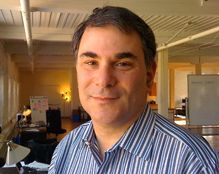Beware of random collisions with unusual suspects. Unless, of course, if you want to learn something new. In that case seek out innovators from across every imaginable silo and listen, really listen, to their stories. New ideas, perspectives, and the big value creating opportunities are in the gray areas between the unusual suspects. It seems so obvious and yet we spend most of our time with the usual suspects in our respective silos. We need to get out of our silos more.
It is human nature to surround ourselves with people who are exactly like us. We connect and spend time with people who share a common world-view, look the same, enjoy the same activities, and speak the same language. We join clubs to be with others like us. I want to belong to the non-club club. The only tribe I want to be in is a tribe of unusual suspects who can challenge my world-view, expose me to new ideas, and teach me something new. Our tribe of unusual suspects can change the world if we connect in purposeful ways.
As an “accidental bureaucrat” over the last six years I had a front row seat to observe the silos in action. Every week went something like this; On Monday I met with the health care crowd, on Tuesday it was the education crowd, on Wednesday the energy crowd and so on, you get the idea. This cycle repeated over and over again. Each crowd was comprised of the usual suspects, well-intentioned people rehashing the same discussion incessantly. The scene is right out of Groundhog Day. Most of the participants were there to represent institutional perspectives and to protect their respective interests. In each crowd there are always a few innovators that want to change the conversation but they make little progress. At the end of each week I always came away with the same conclusion. If only we could take the innovators from across each of the silos and bring them together to enable more random collisions.
 Maybe we could change the conversation if we connect the unusual suspects in purposeful ways. Maybe then we can make progress on the real issues of our time, little things like health care, education, and energy. It will take cross silo collaboration and breaking down the boundaries between industries, sectors, and disciplines.
Maybe we could change the conversation if we connect the unusual suspects in purposeful ways. Maybe then we can make progress on the real issues of our time, little things like health care, education, and energy. It will take cross silo collaboration and breaking down the boundaries between industries, sectors, and disciplines.
People always ask me how I could have worked in the public sector after being in the private sector all of my career. Doesn’t it move too slowly? I don’t know about that. I worked with many large companies, during my road warrior consulting days, and I don’t remember them changing so quickly. You are right, I would say, government agencies move pretty slowly too. I can’t resist adding, I am certain that academic institutions move the slowest of all! The point is few organizations across both the public and private sector have the capacity to innovate and change because they are working hard pedaling the bicycle of their current business model and trying to stay alive and competitive.
In this heads down mode, public and private organizations staying within their silos, do not work and play nicely together across boundaries. Collaboration is an unnatural act. Attempts are mostly under resourced and under supported by sponsors. That’s a shame because the issues we deal with as a community including, health care, education, and energy, will only be fixed it we can experiment with new system approaches that cut across all of our protected silos. We need to think and act more horizontally.
Maybe we don’t need institutions to be the catalyst for change. Maybe in the shiny new networked world we live in, with mega bandwidth and social media platforms, we can self organize to design and test new system approaches that deliver more value to the patient, student, and citizen. It is time to try more stuff and take advantage of the disruptive innovation potential of all the technology we have within reach. We have more technology available to us than we know how to absorb. It isn’t technology that gets in our way. It is our fault. Humans, and the organizations we live in, are both stubbornly resistant to change.
Institutions are moving too slowly. Most were designed for a different century. We have to catalyze change ourselves. Let’s go.
Wanted: Innovators to join a non-club club and tribe of unusual suspects. Bring on more random collisions.









Leave a Reply